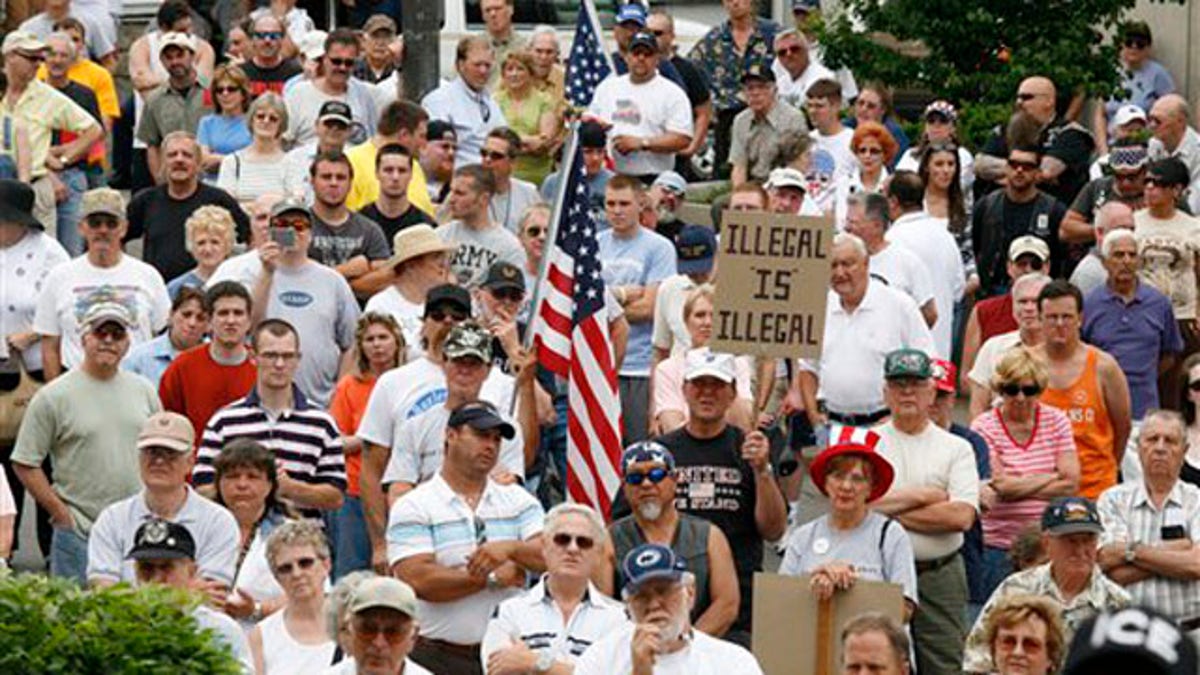
In this June 3, 2007, file photo, a crowd gathers during a rally in support of Hazleton Mayor Lou Barletta in front of City Hall in Hazleton, Pa. (AP Photo)
The town of Hazleton, Pa., is threatening a Supreme Court showdown after a panel of judges last week threw out its restrictions against hiring and renting to illegal immigrants, a decision supporters say gives Washington a free pass to ignore its enforcement responsibilities.
Hazleton Mayor Lou Barletta, who has championed his city's crackdown in the face of persistent legal challenges, told Fox News on Monday that the federal appeals court ruling was a "blow" to cities trying to shield themselves from the "drain" of illegal immigration.
"The problem is that the federal government refuses to regulate the immigration problems that we're having in Hazleton and yet tells us that we can't defend ourselves," he said.
Hazleton's ordinance inspired dozens of imitation laws across the country. The 3rd Circuit Court of Appeals decision would not directly invalidate those laws on a national level, but they could be on the line if the case makes its way to the Supreme Court. Barletta said he intends to appeal.
The Supreme Court has already agreed to review a conflicting decision out of the 9th Circuit Court of Appeals in which the court came down in favor of an Arizona law dealing with the employment of illegal immigrants. That law is separate from the controversial state law requiring police officers to inquire about immigration status.
Advocates of the Hazleton law said the 3rd Circuit ignored a lower court ruling in a separate case in Missouri as well as the earlier Arizona decision, and its decision effectively allows the federal government to hold off on its own enforcement while preventing local officials from stepping in.
"The 3rd Circuit accepted a tried and true formula of the ACLU and its allies that immigration law is too complicated for states to do anything other than dole out services at taxpayer expense, regardless of residency," Dan Stein, president of The Federation for American Immigration Reform, said in a written statement. "This line of argument allows the federal government to continue to mismanage immigration while sending the states into financial chaos and ruin."
Hazleton's ordinances allowed the city to punish landlords found to be renting to illegal immigrants and punish employers found to be hiring them.
The ruling last week accused Hazleton of enacting a "regulatory scheme" that amounted to "cherry picking" which aspects of federal law it wanted to enforce.
"It has chosen to disregard Congress' other objectives -- protecting lawful immigrants and others from employment discrimination, and minimizing the burden imposed on employers," the ruling said.
Though advocates of tough illegal immigration laws on the local level say they're filling a void left by the federal government, the panel of judges suggested in the 188-page ruling that inaction by the federal government is immaterial.
"Such power is delegated by the Constitution exclusively to the federal government, and even if Congress had never acted in the field, states and localities would be precluded from doing so," the ruling said, citing in part a 1976 Supreme Court decision that examined where local governments could regulate immigration. That ruling found that local governments could not enact laws that try to determine who can and cannot live in the country.
The ruling last week also said that "even harmonious regulation is pre-empted" when it comes to housing, but that Hazleton's housing restrictions went beyond federal law.
"It is clear that it has attempted to usurp authority that the Constitution has placed beyond the vicissitudes of local governments," the ruling said.
The ACLU, which has been fighting the Hazleton measures since the first ordinance was adopted in late 2006, hailed the ruling as a landmark victory. The civil rights group said the policies ran afoul of the Constitution and discriminated against Hispanics.
"Divisive laws like these destroy communities and distract from the very real problems that local governments are facing across the country," lead attorney Vic Walczak said in a written statement. "Immigration reform needs to come from the federal level. Local ordinances like these have a toxic effect on the community, injecting suspicion and discriminatory attitudes where they didn't previously exist."
But Hazleton advocates said the ruling tied the hands of local government.
"Today's decision makes the 3rd Circuit the most liberal court in America on immigration issues," Barletta said in a statement after the ruling. "But our fight is not yet over. The City of Hazleton fully intends to appeal this incorrect decision and take the case all the way to the United States Supreme Court, if necessary."




